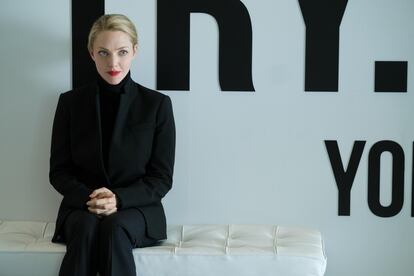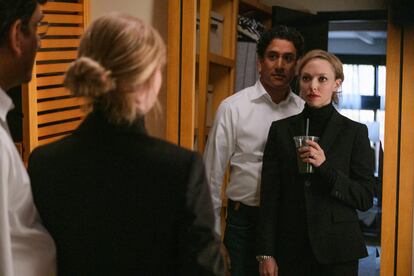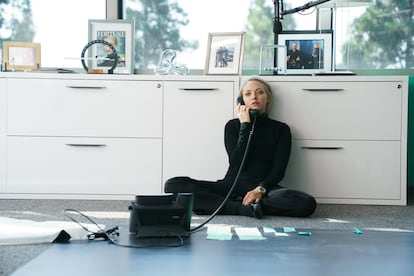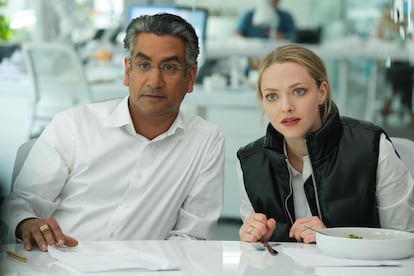‘The Dropout’: How Elizabeth Holmes went from billionaire to convicted fraudster
The TV show follows the rise and fall of the founder of Theranos, a biotech company that promised to revolutionize the future of healthcare but turned out to be a scam

Few stories are as dramatic as the rise and fall of Elizabeth Holmes. When she was 19 years old, she dropped out of a chemical engineering degree at Stanford University to launch the biotech company Theranos, named after a combination of “therapy” and “diagnostics.” The business got off to a flying start. In 2014, Holmes was the youngest woman on Forbes magazine’s Billionaire List, with an estimated fortune of $4.5 billion. But the facade came tumbling down. One year later, she was taken off the list: it was all a sham.
Theranos claimed to have devised blood tests that required just a single drop of blood and could produce results in just minutes thanks to high-tech machines. But the machines did not work. Despite this, she was still able to secure investment from a number of high-profile names, including Bill Clinton, Rupert Murdoch, Carlos Slim and Henry A. Kissinger. The case ended up in court and Holmes was found guilty of three counts of fraud and one count of conspiring to defraud private investors.
Her story has been told in many profiles, reports, documentaries and podcasts, and now it has been fictionalized in the TV show The Dropout, which is based on the podcast of the same name. “It’s a fascinating story. I remember reading about it when the company was falling apart in an article in Vanity Fair. Her character was so interesting to me and so mysterious… I wondered what could be going through her head,” Elizabeth Meriwether, the creator of the miniseries, tells EL PAÍS by video call.

The trial against Elizabeth Holmes should have been over by the time the TV shoot began, but it was delayed due to the coronavirus pandemic and Holmes’s pregnancy. As a result, it didn’t start until the beginning of September 2021, meaning it coincided with filming, which began in June and ended in October 2021. When asked about whether this posed challenges, Meriwether replies: “It was a wild experience.” She adds: “The show doesn’t cover the trial, it focuses on the time when the company was up and running, so nothing that happened was going to affect us. But a lot of messages were shown, I got hundreds of pages of text messages, and I was going through all of them trying to see if there was anything relevant that we could incorporate into the scenes that we shot the next day. It was a really crazy couple of months. But the truth is that a lot of what came out in the trial we already had covered in the scripts.”
Actress Amanda Seyfried plays Elizabeth Holmes in The Dropout, even imitating the entrepreneur’s particular deep voice. “She hit the tone perfectly,” says Meriwether of Seyfriend’s performance. “It is a drama, yes, but there are many moments of comedy. It’s such an absurd world that is shown in this show… Amanda has a knack for staying in that space between comedy and drama. And her voice – Elizabeth Holmes’s voice – is something that Amanda worked on herself. If her performance hadn’t worked, we couldn’t have sustained the series.”

In the eight episodes, the plot delves into Holmes’s personal and professional relationships, in particular with Ramesh “Sunny” Balwani (played by Naveen Andrews), the company’s COO, who was also the entrepreneur’s boyfriend. A lot of the information revealed during the trial concerned this relationship, which the couple kept secret for 12 years. But Meriwether was careful about taking sides with any character. “We wanted to tell the story without judgment, to tell the emotional truth of each individual, to try to understand what happened on a human level, as opposed to the numbers and the timeline that has already been told. What I could do differently was imagine what was happening emotionally to each person at each moment,” she says.
For this reason, The Dropout is a mix of fact and fiction. “I did a lot of research, but there came a point where I had to put all that aside to focus on the characters and think of the plot as a story, not reality. Otherwise, I couldn’t have done my job. It was a constant back and forth, going to what had happened, making sure I understood everything, and then moving away from it to make the best possible story,” explains Meriwether.

Meriwether came to The Dropout from TV comedies. In 2011, she created the sitcom New Girl, which she wrote, directed and produced for eight years. She followed that show with two other comedies: Single Parents and Bless This Mess. The Dropout is her first drama, but she says it also has its comedic moments. “What’s great about drama is that you have time to really dig into the characters. In a comedy, you’re always looking for what joke you’re going to pull in the next scene,” she says. “But the truth is that in the end there is quite a bit of comedy in this series. They are not jokes and we are not satirizing or making fun of anyone. The comedy comes from how absurd the world is and how absurd the choices the characters make are. But if I’m being honest, I think the next thing I’m going to write is some goofy comedy.”
And finally, after so much research and work, was the screenwriter able to unravel Elizabeth Holmes’s mysterious character? “I’ve worked on this series for three years and I still don’t know who she is. Actually, I don’t want the show to provide answers, but rather to add questions to the conversation,” she concludes.
Tu suscripción se está usando en otro dispositivo
¿Quieres añadir otro usuario a tu suscripción?
Si continúas leyendo en este dispositivo, no se podrá leer en el otro.
FlechaTu suscripción se está usando en otro dispositivo y solo puedes acceder a EL PAÍS desde un dispositivo a la vez.
Si quieres compartir tu cuenta, cambia tu suscripción a la modalidad Premium, así podrás añadir otro usuario. Cada uno accederá con su propia cuenta de email, lo que os permitirá personalizar vuestra experiencia en EL PAÍS.
¿Tienes una suscripción de empresa? Accede aquí para contratar más cuentas.
En el caso de no saber quién está usando tu cuenta, te recomendamos cambiar tu contraseña aquí.
Si decides continuar compartiendo tu cuenta, este mensaje se mostrará en tu dispositivo y en el de la otra persona que está usando tu cuenta de forma indefinida, afectando a tu experiencia de lectura. Puedes consultar aquí los términos y condiciones de la suscripción digital.









































